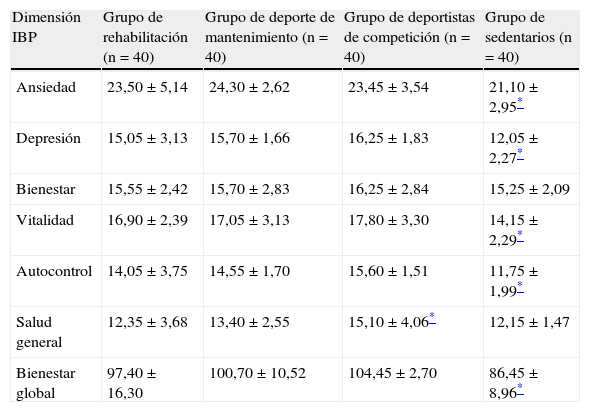La discapacidad física de origen neurológico produce una importante limitación funcional y afectación psicológica que se manifiesta en un menor bienestar personal. La actividad física rehabilitadora y la práctica deportiva forman parte del proceso rehabilitador, pero su efecto en el bienestar no ha sido bien valorado.
ObjetivoEste estudio se ha centrado en analizar la relación entre el bienestar psicológico y el tipo de práctica deportiva en personas con discapacidad física de origen neurológico.
Sujetos y métodosSe evaluó el bienestar psicológico de un total de 160 personas con discapacidad mediante el Índice de Bienestar Psicológico (IBP), categorizados en 4 grupos en relación con la práctica de actividad física: rehabilitación, deporte recreación, deporte competición y sedentarios.
ResultadosLos resultados muestran que los participantes del grupo de sedentarios presentan significativamente un menor bienestar psicológico para todas las dimensiones del IBP, excepto para la dimensión de bienestar, que el resto de grupos. Por otro lado, los participantes del grupo de deporte de competición presentan valores superiores en las dimensiones de autocontrol y de salud general.
ConclusionesLa práctica de actividad deportiva, especialmente competitiva repercute en un mayor bienestar psicológico en personas con gran discapacidad.
Severe physical disability having a neurological origin causes significant functional limitation and psychological effects. This is manifested in less personal well-being. Rehabilitative physical activity and practicing sports form a part of the rehabilitation process. However, their effect on well-being has not been positively valued.
ObjectiveThis study has focused on the analysis of the relationship between psychological well-being and the type of sport practiced in persons having neurological-based physical disabilities.
Subjects and methodsPsychological well-being of 160 disabled persons was assessed using the Psychological Well-Being Index (PWBI). They were categorized into four groups in relation to the practice of physical activity: rehabilitation, sports recreation, sports competition and sedentary activities.
ResultsThe results show that participants in the sedentary group had significantly lower psychological well-being for all the PWBI dimensions than the other groups, except for the welfare dimension. On the other hand, the participants in competitive sports had higher values in self-control and general health dimensions.
ConclusionsThe practice of sports, especially competitive ones, has an impact on greater psychological well-being in people with severe disabilities.
Artículo
Comprando el artículo el PDF del mismo podrá ser descargado
Precio 19,34 €
Comprar ahora







